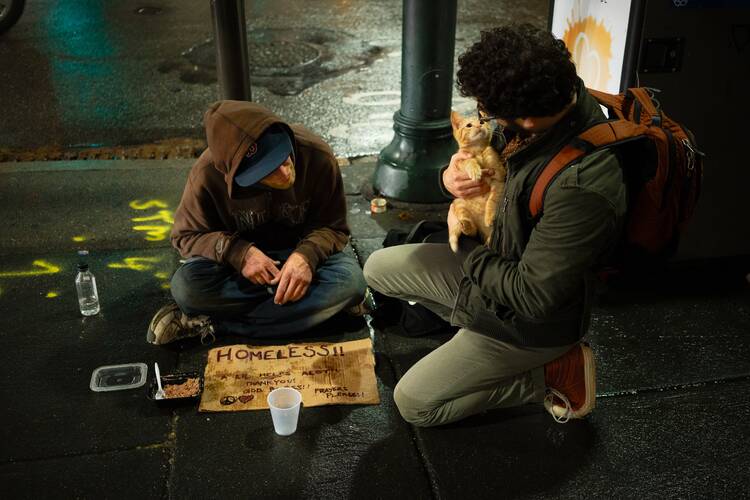God calls us to redistribute not just wealth but mercy too
“Help me, O Lord, that my eyes may be merciful, so that I may never suspect or judge from appearances, but look for what is beautiful in my neighbors’ souls and come to their rescue” (Diary, No. 163). This is an excerpt from St. Faustina’s “Prayer to be Merciful.” Today is Divine Mercy Sunday, a day that reminds us to pray for God’s compassion and forgiveness and to afford the same to one another. The first reading offers an early Christian perspective on mercy and compassion that can inspire us today. The second reading and the Gospel remind us of the power of the Holy Spirit to help propel the church forward.
There was no needy person among them. (Acts 4:34)
What can you do to be more kind and merciful?
How does the Holy Spirit inspire your life?
Are you open to granting forgiveness to people who have wronged you?
The first reading, from Acts, describes early Christians living cooperatively, sharing money and possessions with members of the community. “There was no needy person among them, for those who owned property or houses would sell them, bring the proceeds of the sale, and put them at the feet of the apostles, and they were distributed to each according to need.” Luke’s vision of the early church reflects an intense level of cooperation, a kind of egalitarian society that eliminates poverty. The early Christians take care of one another financially, showing mercy and sharing wealth so that no one is impoverished. Many people today might think that it would be difficult if not impossible to replicate this biblical model, particularly in capitalist societies. However, the principle of the reading is powerful and should inform how we think about wealth accumulation, economic justice and governance today.
In the second reading and the Gospel, the Holy Spirit is referenced in important ways. First, John speaks of faith in Christ, love of God and the importance of keeping the commandments. These acts can be accomplished through the power of the Holy Spirit, who affirms each of these things as true. The Gospel also expresses the role of the Holy Spirit as God’s power and presence within us.
After Mary, the beloved disciple and Peter encounter the empty tomb, Jesus makes his first post-resurrection appearance to Mary. Then he visits the other disciples, wishing them peace and showing the stigmata, the physical signs of the crucifixion on his body. Jesus then breathes on them, saying, “Receive the Holy Spirit.” John beautifully alludes to one of the creation accounts, in which God, after making the first human, “blew into his nostrils the breath of life” (Gn 2:7). The divine breath animates humanity, and Jesus’ breathing the Holy Spirit onto the apostles animates the church. Importantly, Jesus simultaneously commissions the apostles, sending them out to begin to spread the good news. They are also given the authority to forgive sins, as Jesus infuses compassion and mercy into the heart of the church right at its beginning. Divine compassion and mercy are foundational in the church and must remain so in our hearts as well.
On this Sunday of Divine Mercy, we should pray for God’s continued mercy on us all. Moreover, we should be inspired to act mercifully toward one another, sharing resources and gifts and asking for and granting forgiveness to one another.
This article also appeared in print, under the headline “Be Merciful,” in the April 2021, issue.









